WINNERS OF THE ACJ JOURNALISM AWARDS 2022 ANNOUNCED
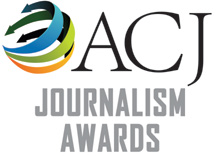
3rd May, 2023, Chennai: The Asian College of Journalism (ACJ) is pleased to announce the winners of the 8th ACJ Awards for Journalism. The awards aim to recognize and honor exceptional journalists who have demonstrated outstanding commitment and dedication to their craft and profession.
This year, the winners in the following categories are:
– ACJ Award for Investigative Journalism: Arunabh Saikia from Scroll.in for his expose titled “Adani power station gets coal from Hasdeo Arand mine allocated to Rajasthan”. Saikia’s investigation sheds light on the alleged illegal coal trading practices of Adani Power Limited and its connections to the political establishment in India.
– K P Narayana Kumar Memorial Award for Social Impact Journalism: Neel Madhav and Alishan Jafri for their work ‘Clicks and Bait: How a constellation of far-right Hindi YouTubers determine what you see on your TV’ published in The Caravan magazine. Madhav and Jafri’s in-depth reportage uncovers the ugly truth behind the manipulation of mainstream media narratives by right-wing amateur youtubers. Their work is a powerful reminder of the social responsibility that comes with journalism.
– Ashish Yechury Memorial Award for Photojournalism: Tanmoy Bhaduri for his photo essay published alongside Roli Srivastava’s piece on the lives and dreams of those who earn their livelihood by scavenging coal in Jharia, one of the coalfields in Jharkhand, India. The story ‘Children of India’s burning coalfields dream of a fire-free future’ is published in Context, a Thomson Reuters Foundation platform. Bhaduri’s images capture the harsh realities of the coal industry and its impact on the lives of ordinary people. His work is a testament to the power of visual storytelling.
The final jury comprising Ruben Banerjee (Chairperson), Jayalakshmi Shreedhar and V. Krishna Ananth chose the winners from shortlisted entries in each category. All awards comprise trophies and citations. Prize money for the Investigative Journalism Award is INR 2 lakhs and the winners of the Social Impact Award and Photojournalism award receive INR 1 lakh each.
The awards were presented to the winners by the Chief Guest Chander Uday Singh, noted lawyer and senior advocate practicing in the Supreme Court of India. Singh also delivered the Lawrence Dana Pinkham Memorial Lecture to the graduating class. He spoke on ‘Reclaiming the Freedom of Speech and Expression in an Orwellian Dystopia’. The awards ceremony and convocation was attended by over nearly three hundred people, including faculty, students and guests at The Music Academy in Chennai.
The jury also selected works from both categories for special mentions:
Investigative Journalism (2)
- Dhanya Rajendran, Sudipto Mondal, Prajwal Bhat, Samrah Attar, Pooja Prasanna and Shivakumar S | The News Minute/Pratidvani – Armed with govt order, Bengaluru NGO steals voter data
The management of the NGO also ran a political consultancy firm. TNM found that they were selling data to politicians and working out of the BJP ward office. The opposition alleged voters were being deleted with these lists. The trail also led TNM to a company connected to the union government. TNM’s report forced the ECI, the SEC and the state govt to order probes. The issue became a huge talking points ahead of the assembly elections in Karnataka. - Himanshi Dahiya | The Quint – “Are We Victims or Criminals?” Child Brides in Gujarat Fight For Nutrition
A multimedia immersive production which features a primitive practice of girls being married off and impregnated multiple times with little family planning or social safety and security. A social evil that continues in 21st century India.
Social Impact Journalism (4)
- Andrew Fidel Fernando | Fiftytwo.in – Hunger | A journey into Sri Lanka’s agricultural heartlands as the economy nosedives.
- Sarita Santoshini | Fiftytwo.in – Uprooted | Residential schools for indigenous people have a long and dark history around the world. In this in-depth reported piece, Sarita Santoshini examines the underreported issue of how residential schools have changed the lives of young Adivasi people and their communities in Odisha’s mining-interest regions.
- C. K. Sivanandan | Malayala Manorama – ‘Stop doing this to our children’– A journalist shines the spotlight in a series on the debilitating difficulties faced by children with learning disabilities, bringing them hope and recognition from the judiciary and the state.
- Parth Nikhil | People’s Archive of Rural India – This series of six articles examined healthcare (or the lack of it) and injustice meted out to some of the most marginalised people in India. The idea behind the series was to highlight how an already dilapidated public health system was never enough to deal with a raging pandemic. And when the pandemic struck, it made an already terrible situation worse.
Photojournalism (2)
- Shobana Radhakrishnan – Photo story: Life in single-room homes in Chennai published in Citizen Matters
- Shefali Rafiq – Kashmir’s tribal women suffer very poor menstrual health. What’s to blame? published in Open Democracy.
The ACJ Journalism Awards Committee received 92 entries in the investigative journalism category and 169 entries in the social impact journalism category and 66 entries in the photojournalism category. The entries came in 5 languages from 86 news organisations and publications as well as independent/freelance journalists from across India for the 2022 edition of the awards. Two preliminary juries comprising 18 faculty members of the ACJ shortlisted entries for the perusal of the final jury.
The jury’s citations for each award read as follows:
Investigative Journalism
“There were several outstanding nominations for this year’s ACJ Award for Investigative Journalism. The jury was spoilt for choice, but a consensus was reached finally on a report by Arunabh Saikia for Scroll.in. Titled “Adani power station gets coal from Hasdeo Arand mine allocated to Rajasthan”, it qualified as the best.
Saikia’s work stands out for its telling expos of the government – industry nexus that has been bleeding the country of its resources. It is a fitting testament to good investigative journalism, embracing time-honoured but now-endangered qualities such as editorial rigour and tireless persistence to uncover the truth.
What Saikia unravelled should leave many red-faced, provided they have any shame. Using RTI and joining the dots thereafter, he has diligently unearthed how millions of tonnes of coal from a mine in Chhattisgarh have been powering private power plants, possibly at prices far lower than the market rate. His report calls attention to a human-caused ecological nightmare unfolding in the region.
Speaking truth to power is increasingly becoming rare. But Saikia’s reportage in Scroll.in is reassuring. It serves to remind us that journalism is very much kicking and alive. Though under siege, not all voices have been silenced yet.”
Social Impact Journalism
“The first place among the entries shortlisted for social impact journalism goes to Neel Madhav and Alishan Jafri for their story Clicks and Bait: How a constellation of far-right YouTubers determine what you see on your TV. Madav and Jafri illustrate how we live in an age where YouTube news channels expose a growing number of audiences to online hate speech. Their work exemplifies studies that show that the more toxic the news content the more users engage with it and the longer it lives, only to soon leap at you from your TV screen.
The award is for many things. It is for their lucid unpacking of the osmosis between click-bait stories on social media and mainstream news reporting. It is for diligent detailing, evident in the way Madhav and Jafri interleave their narrative with case study after case study.
Clicks and Bait walks us through alleyways of Palika Bazar, Shaheen Bhag and Ghaziabad where YouTubers seem to fashion the news as much as they report it. Madhav and Jafri give us a ringside view of how street corner exchanges are set up and then ferried across digital media platforms masquerading as slice-of-life reportage and ending up as breaking news on television screens. In the course of this journey they show how hateful news content polarizes and radicalizes consumers of information and is setting ever-newer lows in public discussions.”
Photojournalism
“In the very first year of its institution, the number of entries received for the Ashish Yechury Memorial Award for Photojournalism is indeed overwhelming. And among them are Tanmoy Bhaduri’s pictures in an essay by Roli Srivastava on the lives and dreams of those who earn their livelihood by scavenging coal in Jharia, one of the coalfields in Jharkhand, India. The story ‘Children of India’s burning coalfields dream of a fire-free future’ is published in Context, a Thomson Reuters Foundation.
Bhaduri’s pictures depict life amidst a dark present; a child in one of the frames in this story peeps out through a gaping hole on the dilapidated wall, only to see darkness on the other side. The engulfing smoke from the insomniac embers hides the very darkness from our naked eyes. Tanmoy Bhaduri captures this darkness that is swallowing Jharia, a mining town in Jharkhand. The pictures tell us a story of the mining pits glowing brighter than the happiest of smiles as families scavenge coal with their darkened hands.
Yet another picture, where the women coal loaders pose for a shot, stands out for its elegant composition and the profound sense of humanity it conveys. In the photograph that follows you see three younger women, also posing, captured in a tighter frame. The contrast between the figures in these two pictures creates a powerful narrative about this coal landscape. Bhaduri juxtoposes the tough physicality of the terrain with the resilience of the residents. The comprehensiveness – how it brings together the harshness of life on the coal terrain, the inner
life of workers, and the complexities involved in their proposed rehabilitation plan – is what impressed the jury and led to this award.”
For previous Winners and Special Mentions, please see: https://www.asianmedia.in/acj/acj-awards-2/acj-award-winners/
Jury Members
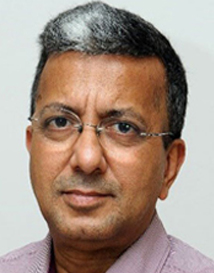
Ruben Banerjee
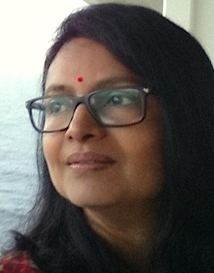
Dr. Jayalakshmi Shreedhar
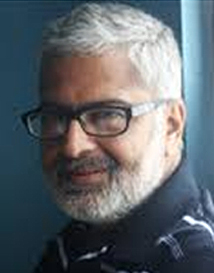
Prof. V. Krishna Ananth
Winners
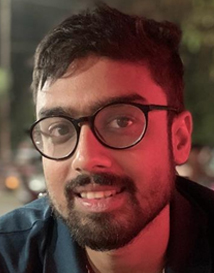
Arunabh Saikia
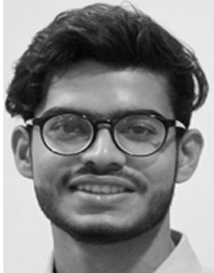
Neel Madhav
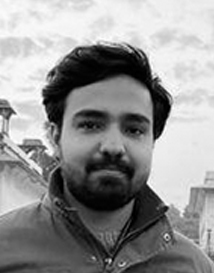
Alishan Jafri
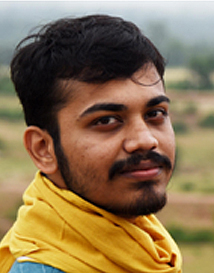
Tanmoy Bhaduri